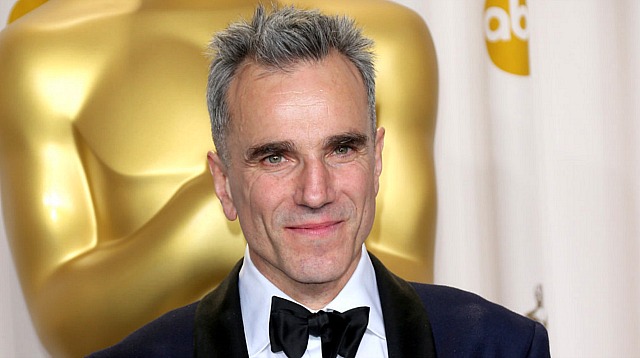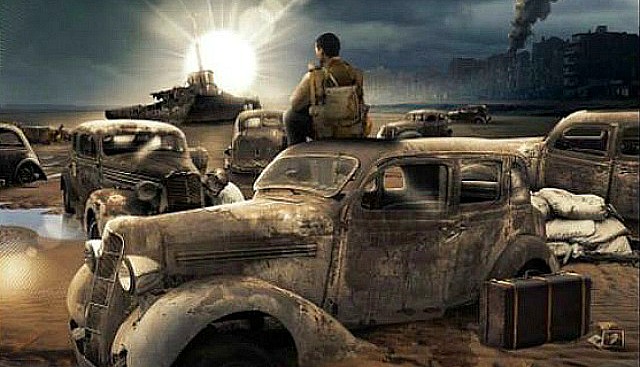Day: June 20, 2017
Them Old PTSD Blues…Again
Miles “don’t be a pervert, man” Teller, who got into some kind of trouble in San Diego last weekend, plays a PTSD-afflicted soldier in Jason Hall‘s Thank You For Your Service (Universal, 10.27). Boilerplate: “As three American soldiers return from Iraq, they struggle to reintegrate with their families and adjust to civilian life while also struggling to forget their memories of war.” This sound way too generic and familiar — American Sniper (also written by Hall) meets Bruce Dern‘s story in Coming Home meets Ang Lee‘s Billy Lynn’s Long Halftime Walk meets Dana Andrews‘ nightmare in The Best Years of Our Lives meets Alexandre Moors‘ The Yellowbirds meets Paul Haggis‘s In The Valley of Elah. Costarring Haley Bennett, Beulah Koale, Amy Schumer, Scott Haze, Joe Cole and Keisha Castle-Hughes.
Daniel Day Lewis Going Back To Shoe-Making?
If you’re really good at something, which maybe 2% or 3% of the population has been lucky enough to discover and nurture, why would you want to quit doing it? Daniel Day Lewis has announced he’s finished with acting for good this time, but why? Not because the pay sucks, I’m sure. Because he’s bored? Get un-bored, get shut of it. Because at age 60 he’s found something more noble or nourishing to devote his life to? Great — but what is that? Is it because he finds acting too taxing or draining? Because he can’t stand the unreality of being paid to pretend to be someone else? If DDL can’t abide his life or his work, fine. But he can’t just plotz and lie in a hammock or walk the earth like Kane in Kung Fu, getting into adventures and shit.
If DDL has run out of gas an an actor, he has to man up and do that thing in some other chosen realm. He has to do that thing that we all have to do because we have no choice because God and life demand it, and because those who wimp out or run away from that struggle are, no offense, ignoble and cowardly.

Is this a Steven Soderbergh– or Frank Sinatra-style retirement? I understand burnout — it happens — but I don’t respect people who’ve been lucky enough to find a calling — to connect with the universe with a rare and beautiful gift that they’ve found within and made into something that has touched people worldwide — and then just walk away from it.
Private Robert E. Lee Prewitt: “A man should be what he can do.” Wells to DDL: You have a duty to go, to be, to strive, to create, to become, to dig in and reach for something better or even wondrous within. Abandoning the struggle is a sin. We’re here only a limited time and then we’re dead, for God’s sake.
Lewis will make the Oscar season rounds one last time in late November and December to discuss what may be his final role, as 1950s fashion designer Charles James in Paul Thomas Anderson‘s Phantom Thread (Focus Features, 12.25).
What caused Lewis to snap and say “fuck it”? Was it the extraordinary task of making Charles James come exactingly alive under the demanding PTA? Was it a sense of existential engulfment? Did he suddenly buckle at the thought of sitting for a Santa Barbara Film Festival tribute at the Arlington?
Time for Beguiled To Face Music
Over the last 18 years Sofia Coppola has confined her directorial focus to a world that she knows like the back of her hand — a realm of privileged, apolitical younger white women living in a well-tended world provided by family or marriage, and not getting laid all that much. The Virgin Suicides (’99), Lost in Translation (’03), Marie Antoinette (’06), Somewhere (’10), The Bling Ring (’10) and The Beguiled (’17). (I’m ignoring A Very Murray Christmas, which I hated.)
My favorite was and still is Somewhere, in part because it felt Antonioni-esque, and because the main character (Stephen Dorff‘s) is ill-defined in a nihilistic sort of way. I admired the ballsiness of Coppola investing in his melancholia while avoiding a three-act “story”.
The Beguiled opens this Friday (6.23). I wasn’t exactly blown away when I saw it in Cannes. “Whoa, calm down on the ‘terrifically entertaining’,” I said to a friend. “It’s pretty good, but not all that different from Don Siegel‘s The Beguiled (’71). Less heated with more emphasis on suggestive humor. And shorter than the Siegel version by 11 minutes, 94 minutes vs. Siegel’s 105. Which I rather liked.
“Yes, the apple pie scene is amusing if not quite ‘funny’. I think Nicole Kidman barking ‘get the saw!’ was meant to challenge Faye Dunaway shouting ‘get the axe!’ in Mommie Dearest.”
Behind The Times
Mattel has introduced 15 new Ken dolls with traits that reflect the world of 2017 — seven skin tones, eight hair colors, nine hairstyles, etc. (There’s even a man-bun Ken.) But they’ve chickened out by only coming up with three body types — original, slim and “broad” (i.e., husky). If they really wanted to reflect present social realities Mattel would have also created a fat-ass Ken (i.e., out of shape, jowly, beer belly). A year and a half ago a Daily Mail piece noted that social media convos were calling for a dad-bod Ken. Lord knows chubby, corpulent characters have been pushing their way into TV serials, comedies (Seth Rogen, Michael Chernus), animated features (the obese Boy Scout kid in Up, fat Snow White in Red Shoes and the 7 Dwarfs). Obviously a distasteful trend, but the culture has tipped in this direction. In hetero circles it’s a relatively rare thing these days to run into an original Ken, much less a slim one. Bod-wise, we’re living for the most part in a Joaquin Phoenix world.
Very Costly Film About An Evacuation
I’m not expecting to be stirred and swept aloft by the Dunkirk narrative. I am, however, expecting to be swept along by Hoyte van Hoytema‘s immaculate IMAX cinematography and what I presume will be an embarassment of fine historical detail. In a word, versimilitude. Either you’ll respect and appreciate what Dunkirk is or you won’t. A mass ensemble piece about a country getting its ass kicked, but its citizens responding in ways that will arouse deep-seated feelings.
What it doesn’t seem to be, if history and the Dunkirk trailers are any guide, is a riveting three-act story about fate and character that builds into something that pays off in a way that most people would call “dramatically satisfying” — i.e., a story with some kind of “stick-it-hard” ending that brings it all home and rings some kind of grand emotional bell.

Dunkirk doesn’t appear to be about nail-bitten tension or a frenzied battle or a triumph or some profound individual reckoning, but about British blood and compassion — familial duty, loyalty, togetherness. A huge civilian community of 700 boats coming together to help 400,000 British troops survive a crushing defeat. That’s the sea part. There’s also the air (Tom Hardy buzzing the Germans in a single-seat Spitfire) and the land (all those helpless British troops huddled on the vast Dunkirk beaches), and of course the blending of these scenarios.
If you can process family devotion as heroic, Dunkirk will probably work for you. At the very least it seems unlikely to be cliche-ridden. It seems to be its own bird. And I admire the running-time discipline — 110 minutes, seven or eight minutes of which will be taken up by closing credits. At least Nolan, whose tendencies as a director of big-concept mindblowers and Batman films has been to go two-hours plus, has restrained himself this one time. Dunkirk is three minutes shorter than Memento, and eight minutes shorter than Insomnia!
Update: The Hollywood Reporter‘s Pamela McClintock is stating that Dunkirk’s running time is actually 107 minutes — one hour, 47 minutes.


